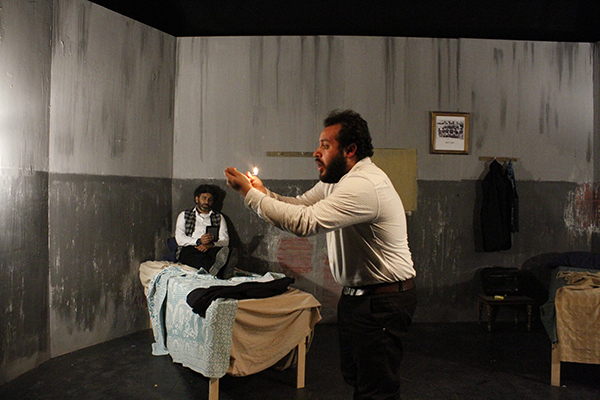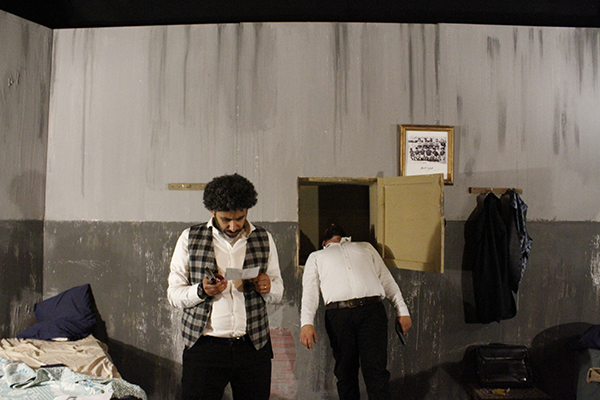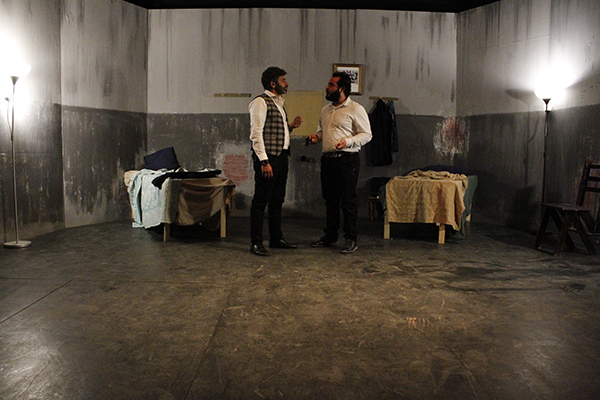A few minutes into the show,other than faint classical Egyptian music playing in the background, we see an otherwise silent scene in which the two characters on stage each seem to be killing time in their own ways – the audience is then suddenly met with a ringing “ya din omi (similar to “oh my God!”),” by one of these mysterious characters.
As the play pans out, we discover the two characters’ relation to each other: they have been sharing a room for quite some time and they are work colleagues. We discover later that their names are Amir and Sherif and they are hit-men awaiting further orders regarding their next mission. In the almost bare room portrayed on stage, consisting of just two beds, an obscure group photo hung on the wall, two doors and a small table, there is also some sort of unexplained small square door right in the middle of the back wall. The door, we later come to realize, is a small freight elevator – hence the derived Arabic title of the play.
An Egyptian counterpart of a western play
Harold Pinter’s ‘The Dumb Waiter’ is a play that was originally written in the 1950s and instantly became one of the playwright’s classics. Its plot, both simple and complex at the same time, caused audiences to question this obscure idea of blindly following authority regardless of surrounding circumstances. In this sense, the play has been interpreted as having an underlying political context: portraying this idea of the injustices and loss of individuality that may unfold from blindly following some kind of higher power in a rather absurd manner – perhaps playing into the absurdity of the situation the characters of the play find themselves in.
“The language of the original play was very hard as it is written in 50s British slang and I had to change it into modern Egyptian slang without losing the absurdity, the comedy and the soul of the original text,” reflected translator and writer of the play’s Arabic text Ahmed El-Shamaa.
An impressive feat for those involved in bringing this play to life for Egyptian audiences, the team – who worked under the management and production of the Kenoma Theatre Company – managed to seamlessly portray Pinter’s timeless text in a way that would both resonate as well as attract Arabic-speaking theatre goers.
Both Shamaa and Al Asanser director Moustafa Khalil’s interpretation and attention to detail was both fitting as well as evident in every line said, prop used and movement made. Shamaa interestingly found ways to work around the classic British humor of the play, adapting it to fit and make it relatable for a modern Egyptian audience. A particularly good example of this was when Sherif and Amir argue about whether the correct phrase to refer to turning on the stove is ‘walaa’ el botagaz’ or ‘shaghal el botagaz’ – on par with the characters’ quarrel in the original text over whether the correct phrasing is ‘light the kettle’ or ‘put on the kettle’.

In addition to this, the freight elevator’s vital role in the play was also well-tailored to fit Egyptian audiences and their humor. At some point during the play, the two characters start receiving unexplained food orders through the small elevator – these otherwise western orders were replaced with everyday well-known Egyptian dishes such as sharkseya (Circassian chicken) and roz bel laban (rice pudding). Even the snacks used to send back up through the freight elevator were everyday Egyptian classics such as Todo brownie and Chipsy.
“I never felt that we had to sacrifice anything,” explains Khalil when asked about the team proceeded with the adaptation, “the beauty of adaptations is that you put yourself in a position of freedom of choice, so we just did whatever we wanted and what we thought would suit the story we were trying to tell.”
What is most notable when it comes to El Asanser is that although it is based on a classic western play, it manages to stand on its own two feet and the dedication to simply tell a story shines through.
“It was a fantastic experience filled with discoveries,” says Khalil, “I had originally come in with an idea of how I wanted to do it, but then in rehearsals we discovered there was a lot of eeriness and hidden tension and once we attacked those feelings, the play really came to life beautifully.”

Actor Ahmed el Hamzawy who played the role of Amir also reflects on his own experience when it came creating his character. “My biggest challenge throughout this process was me trying to constantly resonate with the feel and eeriness of the English version of The Dumb Waiter, yet also sticking to and Egyptian/Arabic version of that Pinter-esque feel,” he explains.
Both Amir and Sherif (played by actor Shady Hebshi) managed to come off as relatable everyday working-class Egyptians who are simply waiting to carry out their orders – whatever they may be. Hebshi’s character was well established right off the bat as the older ‘ more experienced’ worker whereas Hamzawy’s character played the role of the ghalban (seemingly harmless, polite and clueless) – shaping the characters’ power dynamic clearly.
El Asanser is a testament to the beauty and power of theatre, its versatility and its magic in how it resonates with audiences. To lock success, the play proves that is isn’t about the material but what one does with that material.
“I really hope audiences come out with a new experience,” says Khalil, “Egyptian audiences are smart and can understand a genre like this; we faced some confusion from certain audiences who expect only laughs, a good time, and did not know how to feel from this play, but so did Pinter when he first staged this play.”







Comments (0)